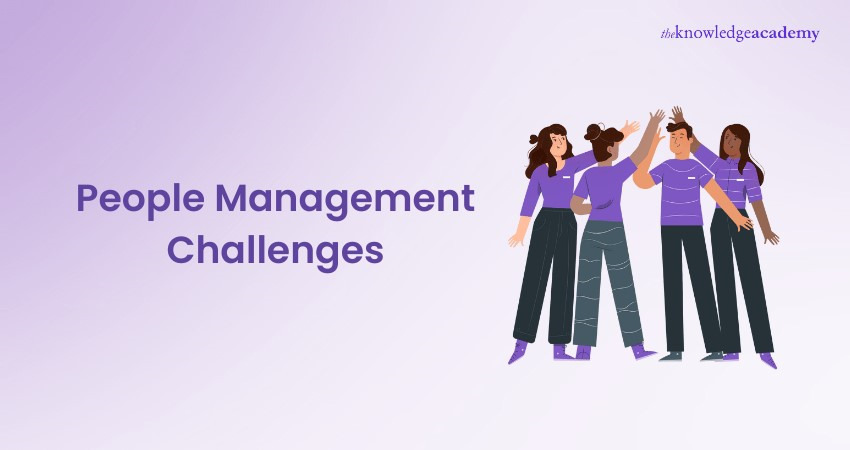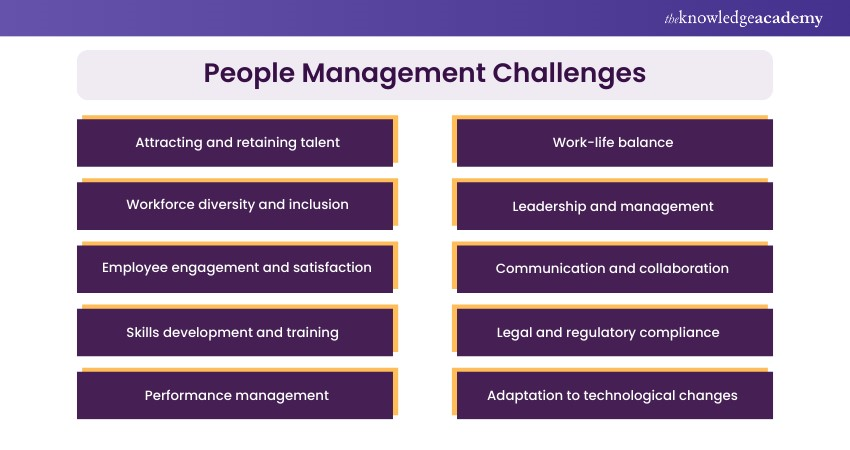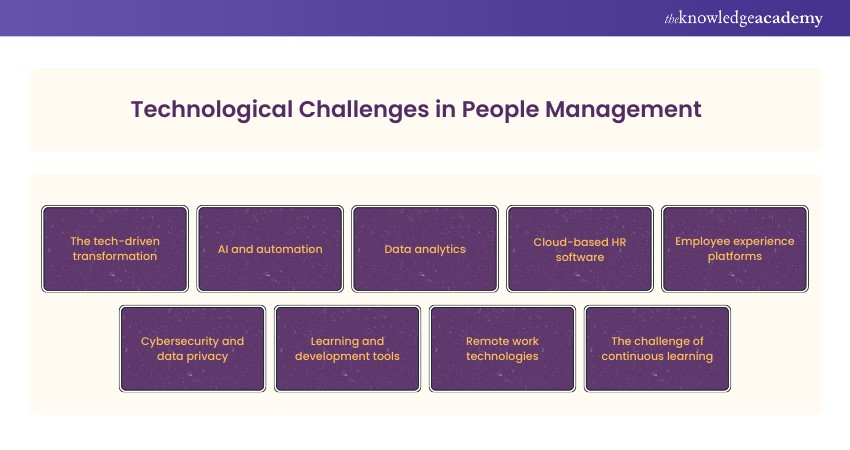We may not have the course you’re looking for. If you enquire or give us a call on +357 26030221 and speak to our training experts, we may still be able to help with your training requirements.
Training Outcomes Within Your Budget!
We ensure quality, budget-alignment, and timely delivery by our expert instructors.

People Management Challenges refer to the complex and multifaceted obstacles and difficulties that organisations face in effectively managing their workforce. These challenges encompass a broad range of issues related to recruiting, retaining, and developing employees, fostering a positive workplace culture, ensuring legal compliance, and adapting to changes in the modern business landscape.
Table of contents
1) People Management Challenges
a) Attracting and retaining talent
b) Workforce diversity and inclusion
c) Employee engagement and satisfaction
d) Skills development and training
e) Performance management
2) Adaptation to technological changes
3) Conclusion
People Management Challenges
People Management is an intricate and multifaceted domain. It encompasses the art and science of recruiting, nurturing, and retaining a diverse workforce. It's about fostering a work environment where employees feel valued, motivated, and engaged. Successful People Management involves striking a balance between organisational needs and individual aspirations. It's a process that requires HR Professionals and leaders to navigate through a myriad of challenges.

From attracting and retaining talent to ensuring legal compliance and adapting to technological advancements, People Management is a constantly evolving field. Understanding the complex landscape of People Management is the first step towards effectively addressing these challenges. It involves recognising that people are at the heart of every organisation, and their satisfaction, development, and well-being are instrumental to an organisation's success.
In the modern business landscape, where competition is intense, and the workforce is increasingly diverse, People Management Challenges have become more complex and nuanced. This blog aims to shed light on these challenges, offering insights, strategies, and solutions to help organisations navigate the path to effective People Management.
Attracting and retaining talent
The ability to attract and retain top talent is a critical factor for an organisation's success. In a competitive job market, companies often find themselves vying for the same skilled individuals. Attracting talent involves not only recruiting but also creating an appealing employer brand and a compelling workplace culture. Once talent is on board, retaining it becomes equally challenging. Employees are more likely to leave if they don't feel valued or if their professional development needs aren't met. Strategies for addressing this challenge include competitive compensation packages, opportunities for growth and advancement, and a positive workplace environment.
Workforce diversity and inclusion
In an increasingly globalised and interconnected world, workforce diversity and inclusion have emerged as vital aspects of People Management. A diverse workforce brings a wide range of perspectives and experiences to the table, fostering creativity and innovation. However, managing diversity effectively and promoting an inclusive environment can be challenging. Organisations must not only hire diverse talent but also ensure that their workplace is inclusive, where every employee feels respected and valued, regardless of their background. This challenge requires not only policies but also cultural shifts within organisations to embrace diversity fully.
Employee engagement and satisfaction
Ensuring that employees are engaged and satisfied with their work is a perennial challenge in People Management. Engaged employees are more productive and committed to their organisations. Strategies to boost engagement include effective communication, recognition programs, and opportunities for skill development. Employee satisfaction goes hand in hand with engagement and often hinges on work-life balance, a positive work environment, and opportunities for career growth.
Skills development and training
As industries evolve, so do the skills and knowledge required of employees. Keeping the workforce equipped with the necessary skills is a challenge in the fast-paced, ever-changing business landscape. Effective skills development and training programs are essential for helping employees stay relevant and competitive in their roles. Organisations need to invest in continuous learning opportunities, from on-the-job training to formal educational programs, to meet this challenge successfully.
Performance management
Performance management involves setting clear goals, providing feedback, and evaluating employee performance. It is a crucial challenge in People Management as it directly impacts on an organisation's productivity and employee growth. Effective performance management includes regular evaluations, constructive feedback, and opportunities for professional development. This process requires HR Professionals and Managers to be skilled in giving feedback and creating a supportive environment for performance improvement.
Work-life balance
Maintaining a healthy work-life balance for employees is a challenge exacerbated by the increasing demands of the modern workplace. Burnout and stress can lead to decreased productivity and employee turnover. Organisations must promote policies and practices that support work-life balance, such as flexible work hours, remote work options, and wellness programs.
Leadership and management
Effective leadership and management are central to People Management. Developing leaders who can inspire and guide their teams is a constant challenge. Leadership skills, such as communication, empathy, and decision-making, play a significant role in creating a positive workplace culture. Organisations must invest in leadership development and provide opportunities for future leaders to grow and excel.
Communication and collaboration
In an age of remote work and global teams, communication and collaboration are challenges that require innovative solutions. Clear and efficient communication is vital for aligning teams and achieving common goals. Collaboration tools, well-defined communication strategies, and the creation of a transparent work culture are essential in addressing this challenge.
Legal and regulatory compliance
Adhering to labour laws and regulations is a fundamental requirement for organisations. Compliance is a complex challenge as laws often vary by region and industry. HR professionals must stay informed about legal changes and ensure that their organisations comply with all relevant regulations. This challenge involves the creation of robust compliance systems and ongoing monitoring.
Adaptation to technological changes
Technological advancements are reshaping the workplace, with AI, automation, and data analytics becoming more prevalent. Adapting to these technological changes is a challenge for HR Professionals. They must be prepared to leverage technology to enhance HR processes, from recruitment and onboarding to performance management and employee development.
Unlock your leadership potential—Join our transformative Leadership Training and lead with confidence, influence, and impact.
Adaptation to Technological Changes
In the digital age, the workplace is evolving at an unprecedented pace, driven by rapid technological advancements. Organisations that succeed in People Management are those that not only embrace technology but also adapt to its continuous changes and innovations. Here, we explore the multifaceted challenge of adaptation to technological changes in the realm of People Management.

The tech-driven transformation
The integration of technology in People Management has brought about significant changes in HR practices. From the use of Artificial Intelligence (AI) for recruitment to cloud-based HR software and data analytics for decision-making, technology has streamlined various HR functions. However, with technology evolving so quickly, keeping up with these changes can be a significant challenge.
AI and automation
AI and automation are reshaping HR in several ways. Chatbots and AI-driven virtual assistants are becoming commonplace for answering employee queries and automating routine tasks, such as leave requests. Automation in recruitment processes allows HR Professionals to focus on strategic tasks while the software handles candidate screening. Adapting to these technologies and ensuring they align with HR goals and values is a challenge that organisations must address.
Data analytics
Data analytics plays a pivotal role in understanding employee trends, engagement levels, and workforce performance. HR Professionals are increasingly required to leverage data analytics tools to make informed decisions. This challenge involves not only adopting analytics tools but also developing data-driven decision-making skills within the HR team.
Cloud-based HR software
Cloud-based Human Resource Management Systems (HRMS) and Human Capital Management (HCM) solutions have revolutionised HR. They provide flexibility, accessibility, and scalability. However, migrating from traditional, on-premises systems to the cloud can be daunting. It's a challenge that requires careful planning, data migration, and change management strategies.
Employee experience platforms
The concept of employee experience has gained prominence. Employee experience platforms aim to enhance every interaction an employee has with the organisation. This includes tools for onboarding, performance management, and continuous feedback. Adapting to these platforms and ensuring they align with the company's culture and objectives is a challenge HR Professionals face.
Cybersecurity and data privacy
With the increasing reliance on technology comes the challenge of safeguarding sensitive employee data. HR Professionals need to be vigilant about cybersecurity and data privacy. Ensuring that employee information is protected from data breaches and cyber threats is paramount.
Learning and development tools
Technology is transforming learning and development with e-learning platforms, webinars, and online courses. HR Professionals must adapt to these tools and create a culture of continuous learning within their organisations.
Remote work technologies
The rise of remote work, accelerated by technology, requires HR to adapt to new paradigms of work. This includes selecting the right collaboration tools, managing remote teams, and fostering a sense of belonging among employees working from different locations.
The challenge of continuous learning
Adapting to technological changes in People Management is an ongoing challenge. HR Professionals must stay updated on emerging technologies, understand their potential impact on the workforce, and invest in continuous learning and training for themselves and their teams.
Elevate your leadership journey with our Successful People Management and Team Leadership Course —ignite excellence in yourself and your team today.
Conclusion
People Management is a dynamic and intricate field that demands continuous adaptation and innovation. Organisations that recognise the importance of their workforce and invest in effective People Management can overcome these challenges. By attracting and retaining talent, fostering diversity and inclusion, ensuring employee engagement and satisfaction, and promoting skills development, organisations can create a thriving workplace culture.
Ignite workplace brilliance with our Staff Motivation Training —inspire, empower, and transform your team for unparalleled success.
Frequently Asked Questions
Upcoming HR Resources – Learn about Human Resources Batches & Dates
Date
 Successful People Management and Team Leadership
Successful People Management and Team Leadership
Fri 14th Feb 2025
Fri 16th May 2025
Fri 25th Jul 2025
Fri 29th Aug 2025
Fri 10th Oct 2025
Fri 28th Nov 2025







 Top Rated Course
Top Rated Course



 If you wish to make any changes to your course, please
If you wish to make any changes to your course, please


